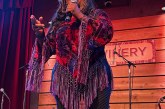
The Guide • Bela Fleck Interview • Ashley Capps Interview • BIG EARS: Appalachia • Music Norway • BIG EARS App (i) • BIG EARS App (Droid) • Tickets
It’s sort of surprising that it’s taken Bela Fleck so long to perform at the Big Ears Festival. After all, Fleck has done more to change the perception of the banjo than any artist since Earl Scruggs turned the five-string banjo into the most defining instrument in bluegrass music.
“I’ve been able to ride the preconceptions and shatter them,” says Fleck. “If I’d play guitar, it might not have been that notable because people are used to all sorts of things on guitar. … The forerunners sort of get some extra credit.”
Maybe so. However, Fleck has inserted the banjo into jazz, rock, classical and world music – most of it by way of his own compositions. His work with New Grass Revival helped revolutionize bluegrass. His group Bela and the Flecktones found international success with a jazz-fusion style. His work with Edgar Meyer opened the door for classical composition, which he continues to this day. And Fleck regularly tours with tabla great Zakir Hussain. He also regularly performs with Abigail Washburn, a banjo master who is steeped in old-time styles and who is his wife, as well. The two are expecting their second child later this year.
“It’s fun to do something new,” says Fleck, “maybe even to the level of a sickness. Maybe it’s an attention span issue. As long as I’m working on something new, I’m healthy and happy. If I’m not, I feel like I’m not living up to the promise I made to myself when I started as a musician. I have that drive to always be pushing myself. Sometimes it’s subtle. If I’m not starting to do something new, I’m not a happy guy.”
If that’s the case, Fleck should be ecstatic. In addition to touring with Washburn as much as possible before the birth, he has upcoming shows with Hussain, jazz legend Chick Corea and classical quartet Brooklyn Rider. He’s working on a new banjo concerto that he’ll perform with the Louisiana Symphony, and he recently produced a collaborative album by Washburn and Chinese musician (and fellow Big Ears performer) Wu Fei. And, oh, he also just started an annual banjo camp in Brevard, North Carolina.
Growing up in New York, Fleck fell in love with the banjo when he heard Scruggs play it on the ‘60s TV show “The Beverly Hillbillies” and thought it was the most beautiful sound he’d ever heard. And while a lot of the music that will be performed in Knoxville March 22-25 will stray far from those roots, Fleck is just as excited to attend Big Ears as an audience member as he is to perform at the festival.
“I want to see everybody I can,” he says. “It’s fascinating music that you don’t get access to in everyday life. It sort of lives on the fringes. It sounds like a party I wanted to be a part of.”
Fleck has two shows officially scheduled for Big Ears: one with Washburn and the other with Brooklyn Rider. But unexpected collaborations and surprise shows are common at the festival; it would be a surprise if Fleck doesn’t sit in with another artist.
“If the right person asks me, I definitely would, but you never know,” he says.
Fleck has no idea how some of the Big Ears artists might perceive his music. People who love specific genres may not realize how much certain artists are expanding other genres they generally don’t listen to.
“To the world of bluegrass, people may think I’m John Coltrane, but [in] the world of avant-garde, they probably just think I’m making bluegrass music,” says Fleck. “It’s not avant-garde, but I’m trying to find something new. Somebody can be incredibly creative within the bluegrass format. You might think of John Zorn and say, ‘Oh, he’s so creative,’ but you might not think of Earl Scruggs as being as creative. But he was, and he continued to be until his dying breath.”
The Guide • Bela Fleck Interview • Ashley Capps Interview • BIG EARS: Appalachia • Music Norway • BIG EARS App (i) • BIG EARS App (Droid) • Tickets







